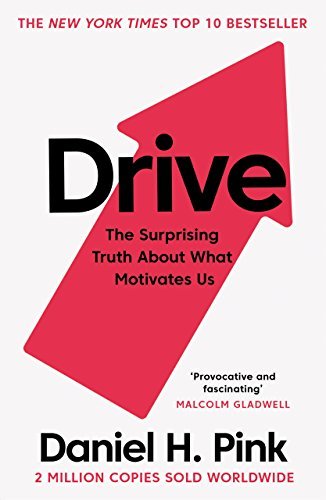Drive (Daniel Pink)
Published: 2023-01-30I had been looking forward to this book for a while, together with "Deep Work" by Cal Newport and "Atomic Habits" by James Clear. And 60 pages in I was excited to be reading it. But passing the half-way point I started to get a little disappointed. The book does get repetitive and there is a lot of engaging sales speak and not much substance (unless you call referring to other people's books "substance").
That is not to say that it is not worth reading - I think it is as a 'primer' or 'persuader' to get you into the real meat-and-potatoes of the topic. It's just that you will need to find that in some other books.
Summary
The book states that the 20th-Century 'carrot-and-stick' method of management is severely outdated, and in its place needs do come methods and framework structured around 'intrinsic motivation'. That is, doing work for it's own sake and getting enjoyment or reward out of the work rather than from external motivators (carrots and sticks). The book was written in 2009, and so this message may already feel out-of-date, but perhaps that is because many companies have actually been making these changes. If so, is this an endorsement of what Pink is saying?
Pink goes on to show us studies that reveal that external motivators, especially financial ones, are not only a poor substitute for intrinsic motivation, but can also have the long-term effect of destroying motivation. This seems to be particularly true for complex and creative work, which is most often what people find most enjoyable.
One quote I like is that:
"We work to master the clarinet on weekends although we have little hope of making a dime"
I am guilty of this - I am slowly learning the piano, the guitar and speaking Vietnamese, and I admit that most of my motivation is simply to 'become better'.
Finally, Pink walks us through the three elements of Intrinsic Motivation: Autonomy, Mastery and Purpose. During this he spends a lot of time talking about two books in particular: "Flow" by Mihaly Csikszentmihalyi (which he must have programmed into a keyboard macro), and "Mindset" by Carol Dweck. It is quite clear that in order to get the most value out of this topic, you should read these books.
Take-aways
Despite this being a bit of a surface-scratcher, I still managed to take three pages of notes.
One key thought I had while reading this is that with the impending AI revolution, it is quite possible that this book will become more relevant. Pink argues that routine work is the only type of work which the old style of management has a moderately positive impact on, as opposed to creative, complex non-routine work. However as he says, "routine work is typically being outsourced or automated". As technology marches forward, AI is going to be able to handle much of the 'routine' work currently undertaken by humans which has been so far out of reach of computer algorithms. This will free us up to do more creative and complex tasks, which means that we will need to be motivated in other ways.
The other two things which stuck with me are Pink's comments on Flow and Mastery (although without having read Mihaly Csikszentmihalyi's book I don't know if Pink can take credit.)
Firstly, Pink introduces the 'Goldilocks Task', that which is not-too-easy and not-too-difficult. This is the type of task which is most likely to induce a 'flow' state in the person executing it. As a good illustration, he says that if a task is much more difficult than the person's capabilities, then this results in anxiety; if it is much simpler then it results in boredom. I can completely relate to this when learning the piano; because I am teaching myself (I had real lessons many years ago), I have to carefully manage what pieces I learn with: 'Twinkle Twinkle' is boring, but 'Fauré's Pavane', while it may sound simple, my current ability means that it leaves me stressed out after the first 8 bars, and much less motivated to learn anything else.
Secondly, Pink introduces the concept of Mastery as being asymptotic - you will forever approach it without quite reaching it. I can see that this applies to the elite sportsmen and teams: despite being the best, they still train to get better. As Pink writes:
"The joy is in the pursuit more than the realisation. Mastery attracts because mastery eludes."
I think this is one concept at the heart of where intrinsic motivation comes from: the enjoyment of pursuing mastery.
In between these two things I think we must also insert 'Passion'. This is something that Cal Newport writes about (and also debunks the notion that passion is innate). The pursuit of mastery is a careful balance of the 'Goldilocks Tasks' and your passion. Without one or the other, you will give up.
Tools
The book did have some useful tools at the back, however I was concerned that the 'toolkit' takes up a good one-third of the book. Out of these, there are two which I am expecting to implement, which I will leave below:
- At the end of each day, ask "Am I better today than I was yesterday". This seems to be a simple test of whether your day was spent well. Depending on your work and family loading, you have a limited number of hours to spend on yourself, so they should be used well.
- Set monthly learning and performance goals and hold yourself to account on them. Pink writes: "If you rationalize failures or gloss over mistakes instead of learning from them, you are wasting your time".
